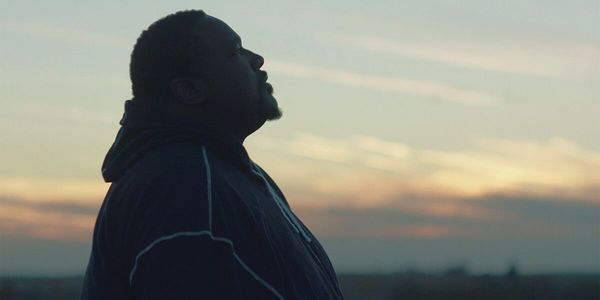Eye For Film >> Movies >> Halfway (2016) Film Review
Halfway
Reviewed by: Jennie Kermode

Quinton Aaron is best known for his role in The Blind Side, as a black teenager who finds himself living in a white world after he is informally adopted. He's been tremendously productive since, but hasn't received the same degree of notice. Here he plays recently paroled prisoner Byron, going to work on his stepbrother's isolated farm - another character dependent on the goodwill of white people, but a tale told from a very different perspective.
With one in three black American men spending time in prison at some point in his life, incarceration is a heavily racialised subject. There are multiple contributing factors and Halfway does not present Byron as an innocent. He has, he accepts, made bad choices, and he's anxious not to do that again. The real problem he faces is that his risk of ending up back inside is now more than 75 per cent (also higher than it would be for a white man), and his non-criminal opportunities are far fewer than they were before. Add to this the tension created by racism in an all white farming community, and life is very difficult. That's before he realises how much criminal activity is going on among the white people around him.

Halfway is a measured and contemplative film which doesn't portray all its white characters as hostile and which effectively delineates different forms of racism. The local shopkeeper is plainly frightened of Byron on their first encounter - it doesn't help that he's a big guy - but her attitude changes once she understands what he's doing in the area. A young woman at the local bar makes sexual comments which, in other contexts, could be damaging, but as she's pretty and serves him free drink, Byron doesn't mind. It's different when he accidentally drives the family truck onto someone else's private land and is firmly warned that "people round here might not like that" by a man whose moral code might come straight out of Straw Dogs or Deliverance.
What about the family he's staying with? His stepbrother isn't around much, so his wife Beth (Amy Pietz) is the boss. She's uncomfortable about having to share her home with a stranger from the outset and when she's under strain her prejudice starts to show, but the amount of pressure she's under also has a transformative effect on Byron, and this is where the core of the story lies. As he begins to understand the challenges of keeping a small farm afloat in a desperate economic climate, the troubled young men is able to look beyond his own needs and start to relate to the world on different terms. An unlikely new friendship and gradual acclimatisation to hard work also contribute to this process, so when the moment of crisis arrives, the viewer can no longer predict what he will do.
Aaron's performance is beautifully judged: quiet, unobtrusive but absorbing. Pietz's delivery is much more forceful but the balance of screen time ensures that she doesn't overwhelm him. The presence of her teenage daughter (Gillian Zinser) reminds us that Byron is himself halfway between childhood and assuming the full responsibilities of adult life, just as he is halfway between prison and freedom and, perhaps, only halfway to being considered a full human being.
Director Ben Caird may be a newcomer but he draws out these nuances with ease over the course of this gently paced tale. There's much about it that still feels rough, but it's an impressive first feature that shows maturity and insight, and it speaks well of all involved.
Reviewed on: 20 Feb 2017
















